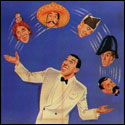|
Chin Strap posted:someone fit the laffer curve to that plot Qwertycoatl posted:He's annoyed at being called out on how terrible that graph is:
|
|
|
|

|
| # ? Apr 19, 2024 07:47 |
|
SupSuper posted:But wait, there's more! Are there really states with over 100% mortality? How does that work?
|
|
|
|
https://twitter.com/AmihaiGlazer/status/1278538748330782720 lollll
|
|
|
|
But seriously, how do you even get fits that bad, except "very carefully" and/or "manually? Like, there's no way those are actual OLS fits for y ~ x
|
|
|
|
Absurd Alhazred posted:Please, I'm begging you, screencap these idiots because they might wisen up and delete this. i'm providing a negative example of low effort to put your positive one in an even better light (thank you
|
|
|
|
He must be trolling though, right?
|
|
|
|
Qwertycoatl posted:He's annoyed at being called out on how terrible that graph is: Holy poo poo, I just understood why he's referencing that article. I'd been really confused because the article basically says "hey, you need to be be careful when presenting your p-value to know exactly what that means". That doesn't have anything to do with this stupid linear regressions he's doing. But then I got it. His saw that the paper said "statistics are difficult to interpret and present in a meaningful way" and his response was just to not bother with them at all. Holy poo poo, this methodology is groundbreaking. BRB, gotta go tell my advisor that he should just give me my doctorate now because my thesis work is hard.
|
|
|
|
Burning Rain posted:He must be trolling though, right? https://twitter.com/shuos_rst/status/1279094151254958080
|
|
|
|
Man, I should have become an econ professor, sounds like a good gig.
|
|
|
|
Binge drinking and low-paid physicians are probably correlated with chuds, which correlate with covid-19 deaths, if those effects are anything more than statistical noise. Here's a better chart: 
|
|
|
|
Don Gato posted:Man, I should have become an econ professor, sounds like a good gig. If you can pretend to believe what the Koch people want you to believe, and have a PhD in econ, you're set for life.
|
|
|
|
Economics is a very dumb field because it gets a load of prestige from having corporate backing but it's just sociology with so much maths thrown in that the economics spend most of the time forgetting that they're actually just doing sociology. "People don't always make rational decisions" was a groundbreaking, highly contentious theory in economics. In the 1980s. And once that theory became accepted, most of them continued to think that "oh, individual people might be irrational sometimes, but the actions of the market as a whole are still always 100% motivated by rational thought", on the basis of zero evidence, because it was easier than dealing with the alternative.
|
|
|
Red Bones posted:Economics is a very dumb field because it gets a load of prestige from having corporate backing but it's just sociology with so much maths thrown in that the economics spend most of the time forgetting that they're actually just doing sociology. "People don't always make rational decisions" was a groundbreaking, highly contentious theory in economics. In the 1980s. Like... They've never heard of mobs?
|
|
|
|
|
Watermelon Daiquiri posted:Like... They've never heard of mobs? There's a good book by an economist called Richard Thaler called 'Misbehaving' - he is one of the economists that eventually managed to shift the field away from this point of view. It has been a few years since I read it so I might be getting some of the details slightly wrong, but economics shifted at some point (I think post-WWII, but it might have been earlier?) towards a model that assumed that a human being would always assess a situation and then choose the option with the greatest long-term gain 100% of the time. And this idea was incredibly pervasive within the field to the point of being the widely accepted truth, and was the basis for a lot of economic models, forecasting, etc etc. It's where the modern-day conception of the 'invisible hand of the market' as meaning 'the market will always find the greatest profit' comes from. So I suppose from the 20th century economist perspective they would have viewed mobs as being groups that were rationally making the best choice possible given their situation. Thaler, along with two other economists (Daniel Kahneman and Amos Tversky) were all separately doing research during the 70s and 80s (I think that was the timeframe) that was poking various holes in this theory. Research on very obvious things like, "if everyone is capable of making perfect long-term decisions 100% of the time, why do people need a separate savings account". There's some very funny bits in the book where he describes spending time with psychologists and sociologists, who are very surprised that what he's researching is considered notable or controversial at all.
|
|
|
|
Watermelon Daiquiri posted:Like... They've never heard of mobs? Mobs are quite reasonable and restrained compared to market forces
|
|
|
|
ikanreed posted:Mobs are quite reasonable and restrained compared to market forces 
|
|
|
|
Red Bones posted:There's a good book by an economist called Richard Thaler called 'Misbehaving' - he is one of the economists that eventually managed to shift the field away from this point of view. It has been a few years since I read it so I might be getting some of the details slightly wrong, but economics shifted at some point (I think post-WWII, but it might have been earlier?) towards a model that assumed that a human being would always assess a situation and then choose the option with the greatest long-term gain 100% of the time. And this idea was incredibly pervasive within the field to the point of being the widely accepted truth, and was the basis for a lot of economic models, forecasting, etc etc. It's where the modern-day conception of the 'invisible hand of the market' as meaning 'the market will always find the greatest profit' comes from. So I suppose from the 20th century economist perspective they would have viewed mobs as being groups that were rationally making the best choice possible given their situation. There was some article I read way back that was kinda similar - it was about how every economics course starts with the microeconomic "everybody is super rational" stuff, but it's only the people who stick around past the first year who get to the macroeconomics which is much more rigorous. So all the worst parts of economics as a field are drummed into students right from the start, and for anyone who only takes a few classes are gonna be the only thing they know.
|
|
|
|
Karia posted:Holy poo poo, I just understood why he's referencing that article. I'd been really confused because the article basically says "hey, you need to be be careful when presenting your p-value to know exactly what that means". That doesn't have anything to do with this stupid linear regressions he's doing. But then I got it. His saw that the paper said "statistics are difficult to interpret and present in a meaningful way" and his response was just to not bother with them at all. Surprised nobody has posted this there yet:
|
|
|
|
Red Bones posted:Economics is a very dumb field because it gets a load of prestige from having corporate backing but it's just sociology with so much maths thrown in that the economics spend most of the time forgetting that they're actually just doing sociology. "People don't always make rational decisions" was a groundbreaking, highly contentious theory in economics. In the 1980s. Basically the entire reason that business schools exist is because business people realized that economics degrees were worthless and just teaching people to use a bunch of math to try to hide the fact that they have no idea what the gently caress they're talking about.
|
|
|
|
Red Bones posted:There's a good book by an economist called Richard Thaler called 'Misbehaving' - he is one of the economists that eventually managed to shift the field away from this point of view. It has been a few years since I read it so I might be getting some of the details slightly wrong, but economics shifted at some point (I think post-WWII, but it might have been earlier?) towards a model that assumed that a human being would always assess a situation and then choose the option with the greatest long-term gain 100% of the time. And this idea was incredibly pervasive within the field to the point of being the widely accepted truth, and was the basis for a lot of economic models, forecasting, etc etc. It's where the modern-day conception of the 'invisible hand of the market' as meaning 'the market will always find the greatest profit' comes from. So I suppose from the 20th century economist perspective they would have viewed mobs as being groups that were rationally making the best choice possible given their situation. People who do econ-adjacent stuff are much more into the behavioral side of things. That's particularly true in the business schools, where you really can't ignore deviations from perfect rationality. I think econ is very early in the process of splitting into two fields, one which is more theoretical and one which is more applied, but it's hard to say exactly how that'll play out.
|
|
|
|
ultrafilter posted:People who do econ-adjacent stuff are much more into the behavioral side of things. That's particularly true in the business schools, where you really can't ignore deviations from perfect rationality. I think econ is very early in the process of splitting into two fields, one which is more theoretical and one which is more applied, but it's hard to say exactly how that'll play out. Most of the money is going to go to those who push the low regulation and low social spending line until Koch is nationalized.
|
|
|
|
Edit: missed a page.
Adhemar has a new favorite as of 23:29 on Jul 3, 2020 |
|
|
|
The Cheshire Cat posted:Basically the entire reason that business schools exist is because business people realized that economics degrees were worthless and just teaching people to use a bunch of math to try to hide the fact that they have no idea what the gently caress they're talking about. That and networking.
|
|
|
|
Strom Cuzewon posted:There was some article I read way back that was kinda similar - it was about how every economics course starts with the microeconomic "everybody is super rational" stuff, but it's only the people who stick around past the first year who get to the macroeconomics which is much more rigorous. So all the worst parts of economics as a field are drummed into students right from the start, and for anyone who only takes a few classes are gonna be the only thing they know. Now that you're on the hook and believe this institution's economics department is on the up and up you get in to the we-have-such-sights-to-show-you macroeconomics as you get into the meat of your undergrad, or enter post grad/eMBA. Here you get into the Austrian travesties of the market shall provide and anything is possible if you gently caress a pig and let us hold on to the video tape.
|
|
|
|
Red Bones posted:There's a good book by an economist called Richard Thaler called 'Misbehaving' - he is one of the economists that eventually managed to shift the field away from this point of view. It has been a few years since I read it so I might be getting some of the details slightly wrong, but economics shifted at some point (I think post-WWII, but it might have been earlier?) towards a model that assumed that a human being would always assess a situation and then choose the option with the greatest long-term gain 100% of the time. And this idea was incredibly pervasive within the field to the point of being the widely accepted truth, and was the basis for a lot of economic models, forecasting, etc etc. It's where the modern-day conception of the 'invisible hand of the market' as meaning 'the market will always find the greatest profit' comes from. So I suppose from the 20th century economist perspective they would have viewed mobs as being groups that were rationally making the best choice possible given their situation. Yeah, Thaler and Rachlin and other folks in that area have pretty soundly demonstrated that humans predictably make impulsive decisions, and simple manipulations of contextual variables can reliably change the choice made. For example, if it is Monday the 1st, and you offer someone a choice between $10 now or $20 later, they will choose differently depending on if you say the $20 is "in 7 days," "in 1 week" or "on the 8th." A lot of folks interpreted that as "People are stupid, predictable, and easily manipulated" and have sent a TON of hate mail to these researchers.
|
|
|
|
https://twitter.com/peterkelly25/status/1278811783591911425?s=21
|
|
|
|
How do economists rationalize payday loans and people having kids? Every time i take the train, I see adds for loans with easy application and gigantic interest rates, directly aimed at getting people to buy luxury crap. There is no possible way anyone would gain anything by taking that loan, and yet, the commercials have been omnipresent for years. And as a father, holy poo poo kids are expensive in a bunch of direct and indirect ways, and the expected return is "maybe they'll help put me in a home when I'm senile". This is in Denmark where caring for olds is normally not the responsibility of the family. And yet, people choose to reproduce all the time, despite having access to (and using up until a point) birth control. What I'm getting at is that economy is a stupid field. I have met some economists who understood basic principles like "people are dumb" though.
|
|
|
|
BonHair posted:How do economists rationalize payday loans and people having kids? Every time i take the train, I see adds for loans with easy application and gigantic interest rates, directly aimed at getting people to buy luxury crap. There is no possible way anyone would gain anything by taking that loan, and yet, the commercials have been omnipresent for years. The explanation I've heard is "time preference", which claims that different people have different weightings for how much they value when they recieve a good. Some people are more willing to sacrifice luxuries in the short term in exchange for greater wealth down the line, while other people demand instant satisfaction. Every time I've seen it pop up, it's always been framed as "well, different people have different values and that's totally fine! It's just that people with low time-preference are destined to become successful entrepeneurs, while people with high time-preference are lazy ingrates." Also apparently black people have high time-preference and that's why they're poor.
|
|
|
|
Most people who take payday loans are doing it to cover some unexpected expense. It's kinda boring that way.
|
|
|
|
Karia posted:The explanation I've heard is "time preference", which claims that different people have different weightings for how much they value when they recieve a good. Some people are more willing to sacrifice luxuries in the short term in exchange for greater wealth down the line, while other people demand instant satisfaction. Every time I've seen it pop up, it's always been framed as "well, different people have different values and that's totally fine! It's just that people with low time-preference are destined to become successful entrepeneurs, while people with high time-preference are lazy ingrates." Yeah, there was a famous study in the 1970s that basically looked at whether toddlers would rather eat one marshmallow now, or two marshmallows 15 minutes later. The experimenters claimed that this was testing self-control, and went on to show that this preference correlated strongly with higher income and test scores later in life. Economists have taken this study seriously for over fifty years. Interestingly enough, other researchers showed that the test wasn't measuring self control: it was testing the toddlers' belief that strange adults would follow through on their promises. Also the high incomes and test scores were because the original study didn't control for socio-economic background.
|
|
|
|
Tobermory posted:Yeah, there was a famous study in the 1970s that basically looked at whether toddlers would rather eat one marshmallow now, or two marshmallows 15 minutes later. The experimenters claimed that this was testing self-control, and went on to show that this preference correlated strongly with higher income and test scores later in life. Economists have taken this study seriously for over fifty years. What if I don't like marshmallows and would rather give them to somebody else? ... Oh my god, that's why I'm a socialist. It all makes sense.
|
|
|
|
Tobermory posted:Yeah, there was a famous study in the 1970s that basically looked at whether toddlers would rather eat one marshmallow now, or two marshmallows 15 minutes later. The experimenters claimed that this was testing self-control, and went on to show that this preference correlated strongly with higher income and test scores later in life. Economists have taken this study seriously for over fifty years. I held off on my marshmallow on the assumption I would get two marshmallows later and now I don't have anything and the researcher has a house made of marshmallows. The system works.
|
|
|
|
Outrail posted:I held off on my marshmallow on the assumption I would get two marshmallows later and now I don't have anything and the researcher has a house made of marshmallows. The system works. I took my single marshmallow and wisely loaned out 7 marshmallows to other people profiting off each of those loans. Then when the marshmallow market crashed because all the kids I loaned to ate their marshmallows (irrationally!) I paid myself 200 marshmallows and handed of all my marshmallow debt to the government.
|
|
|
|
Red Bones posted:And once that theory became accepted, most of them continued to think that "oh, individual people might be irrational sometimes, but the actions of the market as a whole are still always 100% motivated by rational thought", on the basis of zero evidence, because it was easier than dealing with the alternative. less fun fact from page two: only eight percent of the finance professors surveyed do not believe that future price movements can be predicted from past price movements and the rest all still get paid to teach finance
|
|
|
|
BonHair posted:How do economists rationalize payday loans and people having kids? Every time i take the train, I see adds for loans with easy application and gigantic interest rates, directly aimed at getting people to buy luxury crap. There is no possible way anyone would gain anything by taking that loan, and yet, the commercials have been omnipresent for years. Economist do not believe that people only value money. Their answer would be that people have kids because they like kids.
|
|
|
|
Tobermory posted:Yeah, there was a famous study in the 1970s that basically looked at whether toddlers would rather eat one marshmallow now, or two marshmallows 15 minutes later. The experimenters claimed that this was testing self-control, and went on to show that this preference correlated strongly with higher income and test scores later in life. Economists have taken this study seriously for over fifty years. Its not nearly as simple as that - its a combination of probability and delay discounting. The kids who don't wait tend to engage in more risky behavior, more drug use, more crime, lower grades, have higher rates of divorce, higher BMI, lower savings, etc. even after you control for differences in incomes. Its a self-perpetuating cycle in which an impoverished environment teaches you to ask impulsively (because the second marshmallow may never come), but then that same impulsivity interferes with your chances of getting OUT of an impoverished environment. There's been literally decades of research in this area (including the stuff I've published) - we don't depend on a single Mischel study anymore, especially when those flaws are addressed in replication studies.
|
|
|
|
Economics has a unit called a util which is just how much you get out of consuming a thing (or having a kid, buying a car etc) which they use to explain behavior. Because obviously pretty much no one (except some FIRE nuts) calculates everything as what is the most profitable course of action. Otherwise why would anyone buy almost anything? Everyone would be sleeping in cardboard boxes between their 18 hour work shifts if there was no explanation for consumption.
|
|
|
|
The replication crisis has been very fun to watch. Every year it just gets more fun!
|
|
|
|
Teriyaki Hairpiece posted:The replication crisis has been very fun to watch. Every year it just gets more fun! That's odd, I've been watching the replication crisis on my own equipment and haven't seen any significant change in fun levels
|
|
|
|

|
| # ? Apr 19, 2024 07:47 |
|
Angepain posted:That's odd, I've been watching the replication crisis on my own equipment and haven't seen any significant change in fun levels Are you TRYING to put a bunch of decent funologists out of work??
|
|
|




 curve
curve


























 Yes, it's like a lava lamp.
Yes, it's like a lava lamp.
















